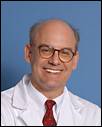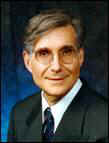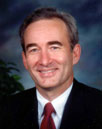| |
|
| |
 Christie M. Ballantyne, M.D., is Professor of Medicine and Associate Chief and Clinical Director, Section of
Atherosclerosis, Department of Medicine, Baylor College of Medicine, Houston, Texas; Director, Center for Cardiovascular Disease Prevention, Methodist DeBakey Heart Center; and Co-Director, Lipid Metabolism and
Atherosclerosis Clinic, The Methodist Hospital. Dr. Ballantyne received his medical degree from Baylor College of
Medicine, completed his residency training in internal medicine at the University of Texas Southwestern Medical
School in Dallas, and then completed a fellowship in clinical cardiology at Baylor College of Medicine. The author of numerous peer-reviewed journal articles, Dr. Ballantyne is editor of lipidsonline.org. and an
associate editor of Circulation. His research interests include the pathophysiology of atherosclerosis, with an emphasis
on monocyte activation and adhesion.
Christie M. Ballantyne, M.D., is Professor of Medicine and Associate Chief and Clinical Director, Section of
Atherosclerosis, Department of Medicine, Baylor College of Medicine, Houston, Texas; Director, Center for Cardiovascular Disease Prevention, Methodist DeBakey Heart Center; and Co-Director, Lipid Metabolism and
Atherosclerosis Clinic, The Methodist Hospital. Dr. Ballantyne received his medical degree from Baylor College of
Medicine, completed his residency training in internal medicine at the University of Texas Southwestern Medical
School in Dallas, and then completed a fellowship in clinical cardiology at Baylor College of Medicine. The author of numerous peer-reviewed journal articles, Dr. Ballantyne is editor of lipidsonline.org. and an
associate editor of Circulation. His research interests include the pathophysiology of atherosclerosis, with an emphasis
on monocyte activation and adhesion.
Dr. Ballantyne is engaged in research activities for AstraZeneca, diaDexus, GlaxoSmithKline, Merck, Novartis,
Pfizer, Reliant, Schering-Plough, Kos Pharmaceuticals, Sankyo-Pharma, Gene Logic, Inc., and Integrated Therapeutics, Inc. He is a consultant for AstraZeneca, Merck, Novartis, Pfizer, Reliant, Schering-Plough, and
Bayer and is a member of the speakers bureau for AstraZeneca, Bristol-Myers Squibb, Kos, Merck, Novartis, Pfizer, Reliant, Schering-Plough, and Sanofi-Synthelabo. He has received honoraria from AstraZeneca, Bristol Myers-Squibb,
Kos, Merck, Novartis, Pfizer, Reliant, Schering-Plough, and Sanofi-Synthelabo.
Dr. Ballantyne will discuss the unlabeled use of CETP inhibitor to raise HDL-C and recombinant apo A-I Milano to treat atherosclerosis. |
|
| |
|
| |
 Phil Hemstreet, M.D., is a 2nd year fellow in the Division of Cardiovascular Medicine at the University of Texas
in Houston. Dr. Hemstreet received his B.S degree in molecular biology from Rhodes College and The University of
Alabama in Birmingham and his medical degree from the University of Alabama School of Medicine. He completed his
training in internal medicine at the Baptist Health System where he was a Chief Resident and Instructor of Medicine. Board certified in internal medicine, Dr. Hemstreet is heavily involved in organized medicine and is
currently the Chair of the American College of Physicians' Council of Associates. His research interests include
the physiology and treatment of acute coronary syndromes, percutaneous valve repair/replacement and connecting
laboratory research to the bedside.
Phil Hemstreet, M.D., is a 2nd year fellow in the Division of Cardiovascular Medicine at the University of Texas
in Houston. Dr. Hemstreet received his B.S degree in molecular biology from Rhodes College and The University of
Alabama in Birmingham and his medical degree from the University of Alabama School of Medicine. He completed his
training in internal medicine at the Baptist Health System where he was a Chief Resident and Instructor of Medicine. Board certified in internal medicine, Dr. Hemstreet is heavily involved in organized medicine and is
currently the Chair of the American College of Physicians' Council of Associates. His research interests include
the physiology and treatment of acute coronary syndromes, percutaneous valve repair/replacement and connecting
laboratory research to the bedside.
Dr. Hemstreet reports no commercial conflict of interest. His only disclosure is that his golf handicap is a 14 (up significantly from his days in internal medicine), primarily the result of a growing family, passion for
college football (ROLL TIDE!) and love of his career in cardiovascular medicine.
|
|
| |
|
| |
 John LeDoux, M.D., is a 1st year fellow in the Division of Cardiovascular Medicine at the University of Texas in Houston. Dr. LeDoux received his B.S
degree in chemical engineering from Louisiana State University in Baton Rouge and his medical degree from the University of South
Alabama School of Medicine. He completed his training in internal medicine at the University of South Alabama Medical Center in Mobile,
Alabama and is board certified in internal medicine. He has been married for eight years and is the proud father of three children.
John LeDoux, M.D., is a 1st year fellow in the Division of Cardiovascular Medicine at the University of Texas in Houston. Dr. LeDoux received his B.S
degree in chemical engineering from Louisiana State University in Baton Rouge and his medical degree from the University of South
Alabama School of Medicine. He completed his training in internal medicine at the University of South Alabama Medical Center in Mobile,
Alabama and is board certified in internal medicine. He has been married for eight years and is the proud father of three children.
Dr. LeDoux reports no commercial conflict of interest.
|
|
| |
|
| |
 Peter Libby, M.D., is the Chief of Cardiovascular Medicine at the Brigham & Women's Hospital, Boston, Massachusetts. He also serves as the
Mallinckrodt Professor of Medicine at Harvard Medical School. Dr. Libby's current major research focus is the role of inflammation in vascular
diseases such as atherosclerosis. He has received numerous awards and recognitions for his research accomplishments. His areas of clinical
expertise include general and preventive cardiology.
Peter Libby, M.D., is the Chief of Cardiovascular Medicine at the Brigham & Women's Hospital, Boston, Massachusetts. He also serves as the
Mallinckrodt Professor of Medicine at Harvard Medical School. Dr. Libby's current major research focus is the role of inflammation in vascular
diseases such as atherosclerosis. He has received numerous awards and recognitions for his research accomplishments. His areas of clinical
expertise include general and preventive cardiology.
An extensive author and lecturer on cardiovascular medicine and atherosclerosis, Dr. Libby has published numerous research articles in
medical journals including Circulation, The Journal of Clinical Investigation, The Proceedings of the National Academy of Sciences, The New England Journal of Medicine, and Nature. He is co-Editor of
Braunwald's Heart Disease, Edition 6. Dr. Libby also contributed the chapters on the pathogenesis, treatment, and prevention of atherosclerosis
to the 15th edition of Harrison's Principles of Internal Medicine. He has held numerous visiting professorships and has been selected to deliver
named lectures throughout the world on many occasions.
Dr. Libby is a Member of the Association of American Physicians and the American Society for Clinical Investigation. He has served in many roles
as a volunteer for the American Heart Association, including Chairmanship of several research committees and Membership in the Executive Committees
of the Councils on Arteriosclerosis, Circulation, and Basic Science. He has also served as a frequent consultant to the National Heart, Lung and
Blood Institute, and has recently completed a five-year term on the Board of Scientific Councilors. He is the recipient of a MERIT Award from the Institute.
Dr. Libby earned his medical degree at the University of California, San Diego and completed his training in internal medicine and cardiology at
the Peter Bent Brigham Hospital (currently Brigham & Women's Hospital). He also holds an honorary Master of Arts Degree from Harvard University.
Dr. Libby has served as a consultant for AstraZeneca Pharmaceuticals LP; AVANT Immunotherapeutics, Inc.; Bayer
Corporation; Bristol-Myers Squibb Company; Interleukin Genetics Incorporated; Merck & Co., Inc.; Millennium Pharmaceuticals, Inc.; Novartis Pharmaceuticals Corporation; Pfizer Inc; Pierre Fabre Inc.; Sankyo Pharma;
Sanofi-Synthelabo Inc.; Schering-Plough Corporation; Volcano Therapeutics, Inc. He has participated in Speakers Bureau activities for AstraZeneca Pharmaceuticals LP; Bayer Corporation; Bristol-Myers Squibb Company; Merck &
Co., Inc.; Novartis Pharmaceuticals Corporation; Pfizer Inc; and has received grants and research support from AstraZeneca Pharmaceuticals LP; Bayer Corporation; Bristol-Myers Squibb Company; GlaxoSmithKline; Merck & Co.,
Inc.; Millennium Pharmaceuticals, Inc; Novartis Pharmaceuticals Corporation; Pfizer Inc; Sankyo Pharma.
|
|
| |
|
| |
 Vijay Nambi, M.D., is a 2nd year fellow in cardiology at Baylor College of Medicine. Dr. Nambi graduated from Chennai (Madras) Medical College, Chennai, India.
He completed his internal medicine residency at the Cleveland Clinic Foundation, where he subsequently pursued a fellowship in vascular medicine. Dr. Nambi's research interests in
atherosclerosis and preventive cardiovascular medicine include biomarkers, risk stratification and peripheral arterial disease.
Vijay Nambi, M.D., is a 2nd year fellow in cardiology at Baylor College of Medicine. Dr. Nambi graduated from Chennai (Madras) Medical College, Chennai, India.
He completed his internal medicine residency at the Cleveland Clinic Foundation, where he subsequently pursued a fellowship in vascular medicine. Dr. Nambi's research interests in
atherosclerosis and preventive cardiovascular medicine include biomarkers, risk stratification and peripheral arterial disease.
Dr. Nambi reports no commercial conflict of interest.
Dr. Nambi will discuss the unlabeled use of CETP inhibitor to raise HDL-C and recombinant apo A-I Milano to treat atherosclerosis. |
|
| |
|
| |
 Dr. Richard W. Smalling, Cyberounds® Cardiovascular Medicine moderator, is the Jay Brent Sterling Professor of Cardiovascular Medicine and Co-Director,
Division of Cardiology, University of Texas Medical School at Houston. A native Texan, Dr. Smalling received his B.S.
in Aerospace Engineering, M.S. in Bio-Medical Engineering, M.D. and Ph.D. from the University of Texas and did his
residency training and cardiology fellowship at UCSD. Board certified in internal medicine, cardiovascular medicine,
and interventional cardiology, Richard is the author of over 150 peer-reviewed articles and more than a dozen textbook
chapters. He is on the editorial board of several cardiovascular journals. Dr. Smalling is an active investigator in
clinical cardiology in the areas of thrombolysis and facilitated PCI for AMI, new interventional devices and
percutaneous left ventricular assist devices. In addition to his clinical duties as an interventional cardiologist in
patients with coronary, valvular adult congenital and peripheral vascular disease, Richard has an active animal
physiology laboratory engaged in evaluation of mechanisms for prevention of reperfusion injury as well as new device
development for coronary interventions and left ventricular assist.
Dr. Richard W. Smalling, Cyberounds® Cardiovascular Medicine moderator, is the Jay Brent Sterling Professor of Cardiovascular Medicine and Co-Director,
Division of Cardiology, University of Texas Medical School at Houston. A native Texan, Dr. Smalling received his B.S.
in Aerospace Engineering, M.S. in Bio-Medical Engineering, M.D. and Ph.D. from the University of Texas and did his
residency training and cardiology fellowship at UCSD. Board certified in internal medicine, cardiovascular medicine,
and interventional cardiology, Richard is the author of over 150 peer-reviewed articles and more than a dozen textbook
chapters. He is on the editorial board of several cardiovascular journals. Dr. Smalling is an active investigator in
clinical cardiology in the areas of thrombolysis and facilitated PCI for AMI, new interventional devices and
percutaneous left ventricular assist devices. In addition to his clinical duties as an interventional cardiologist in
patients with coronary, valvular adult congenital and peripheral vascular disease, Richard has an active animal
physiology laboratory engaged in evaluation of mechanisms for prevention of reperfusion injury as well as new device
development for coronary interventions and left ventricular assist.
Within the past three years, Dr. Smalling has received grant support from Centocor/SCIOS, Boston Scientific,
DataScope, and AMED. |
|

|

